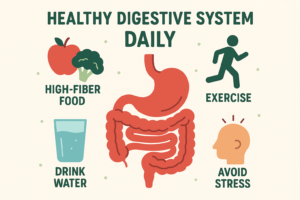
Your digestive system works hard every day — breaking down food, absorbing nutrients, and eliminating waste. When it’s functioning properly, you feel energized, light, and healthy. But when it’s out of balance, problems like bloating, constipation, acidity, or indigestion can take over your day.
Thankfully, by following a few simple, everyday habits, you can keep your digestion smooth and strong. This guide will share practical and proven tips to help you maintain a healthy digestive system daily, along with some expert advice and high-traffic keywords to make this your go-to guide for gut health.
🥦 1. Eat a High-Fiber Diet
Fiber is your digestive system’s best friend. It keeps food moving through your gut, prevents constipation, and supports a healthy gut microbiome.
Foods rich in fiber include:
- Whole grains (brown rice, oats, barley)
- Fruits like apples, pears, and berries
- Vegetables such as broccoli, carrots, and spinach
- Legumes like beans, lentils, and chickpeas
High fiber foods for digestion help clean the intestines and keep your stomach light and toxin-free.
Tip: Start your day with oatmeal or fruit to gently kickstart digestion.
💧 2. Stay Hydrated All Day
Water is essential for digestion. It helps break down food, dissolve nutrients, and soften stool. Not drinking enough can lead to constipation and sluggish digestion.
How much water do you need?
Aim for at least 8–10 glasses daily. You may need more if you’re active or in a hot climate.
Bonus Tip: Warm water with lemon before breakfast can stimulate digestive enzymes.
🚶♂️ 3. Move Your Body
Regular physical activity not only benefits your heart and muscles but also stimulates your intestines.
Best exercises for digestion:
- Walking after meals
- Light yoga poses like “wind-relieving pose” or “cobra pose”
- Simple stretching and breathing exercises
Moving your body supports bowel movements and reduces bloating.
🕒 4. Eat on Schedule
Irregular eating habits confuse your digestive system. Skipping meals or overeating late at night disrupts your natural digestive rhythm.
Create a consistent meal routine:
- Eat smaller portions every 3–4 hours
- Avoid heavy meals just before bedtime
- Chew slowly to help the stomach break down food easily
Proper meal timing improves digestion, reduces acid reflux, and keeps your metabolism healthy.
🧘♀️ 5. Manage Stress
Your gut and brain are closely connected, and stress can wreak havoc on digestion — causing cramps, bloating, or diarrhea.
Simple ways to reduce stress:
- Deep breathing or meditation (10 minutes a day)
- Gentle yoga
- Journaling your thoughts
- Listening to music or spending time in nature
Managing stress helps support healthy gut function and overall well-being.
❌ 6. Limit Processed Foods and Sugar
Highly processed foods, fried items, and excess sugar can harm your gut lining and lead to inflammation, gas, and imbalanced gut bacteria.
Avoid or limit:
- Packaged snacks and chips
- Sugary sodas and drinks
- Fried fast food
- Artificial sweeteners
Instead, choose whole, unprocessed foods with clean ingredients.
🦠 7. Add Probiotics and Prebiotics
Your gut contains trillions of good bacteria that help break down food, absorb nutrients, and fight bad microbes. Keeping these bacteria balanced is crucial.
Probiotic foods (good bacteria):
- Yogurt with live cultures
- Buttermilk
- Kefir
- Sauerkraut
Prebiotic foods (feed good bacteria):
- Garlic
- Onions
- Bananas
- Oats
Including gut-friendly foods regularly can strengthen your digestive system naturally.
🛌 8. Get Quality Sleep
Poor sleep can affect hormone levels and slow down digestion.
Tips for better gut-friendly sleep:
- Avoid screen time 1 hour before bed
- Keep your room dark and cool
- Maintain a regular sleep schedule
A healthy gut often reflects a healthy sleep cycle.
🧴 9. Avoid Overuse of Medications
Overusing painkillers, antibiotics, or acid blockers can disrupt gut bacteria and irritate your stomach lining.
What you can do:
- Take only doctor-recommended medicines
- Don’t self-medicate for minor stomach issues
- Always complete the prescribed antibiotic course if necessary
If you’re experiencing frequent stomach pain or digestive distress, it’s best to seek advice from a specialist. The top 10 gastroenterologist in Surat offer expert care and can guide you on safe treatments tailored to your body.
🧠 10. Listen to Your Gut
If your stomach feels off — whether it’s persistent bloating, gas, or irregular bowel habits — don’t ignore it. These could be early signs of digestive disorders like IBS, GERD, ulcers, or more.
When to seek medical help:
- Ongoing pain or discomfort
- Blood in stool
- Unexplained weight loss
- Frequent heartburn or indigestion
Catching issues early helps avoid more serious complications.
✅ Conclusion
Taking care of your digestive system is easier than you think. With a few consistent habits, you can enjoy more energy, clearer skin, stronger immunity, and better overall health.
Here’s a quick recap of the top tips to maintain a healthy digestive system daily:
- Eat fiber-rich and clean foods
- Stay hydrated
- Move daily
- Sleep well
- Avoid stress
- Say no to junk
- Support your gut with probiotics
- Seek expert advice when needed
A healthy gut isn’t just about digestion — it’s about living your best life every day.
